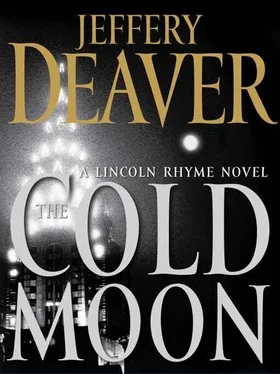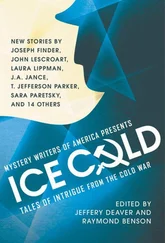She glanced toward the bottle. "You stumbled. Everybody stumbles."
"Not what I'm talking about. This's because I fucked everything up."
"What do you mean, Art?"
"Because I was a cop. I wasted everything. I wasted my life."
She felt a chill; his words echoed her feelings. He was expressing exactly the reason she wanted to leave the force. She said, "Art, how 'bout we get you home?"
"I could've done a hundred other things. My brother's a plumber. My sister went to grad school and works for an ad agency now. She did that butterfly commercial for those feminine things. She's famous. I could've done something."
"You're just feeling-"
"Don't," he snapped, pointing a finger at her. "You don't know me good enough to talk to me that way. You got no right."
Sachs fell silent. True. She didn't have the right.
"Whatever happens 'causa what you're looking into, I'm fucked. Good or bad, I'm fucked."
Her heart chilled to see his anger and pain; she put her arm around him, "Art, listen-"
"Get your hands off me." His head lolled against the window.
Coyle walked up a moment later, directing a Yellow Cab toward the van. Together Coyle and Sachs helped Snyder to the cab and got him inside. She gave the driver Snyder's address, then emptied her wallet, handing him close to fifty dollars and the detective's car keys. "I'll call his wife, let her know he's coming," she told the cabbie. The taxi eased into thick Midtown traffic.
"Thanks," she said to Coyle, who nodded and walked off. She was grateful he didn't ask any questions.
After he was gone, Sachs reached into her pocket and extracted Snyder's pistol, which she'd lifted from his rear belt holster when she'd put her arm around him. Maybe he had another piece at home but at least he wouldn't be using this one to kill himself. She unloaded it, kept the bullets and hid the weapon in the springs under the front passenger seat. She then locked the door and returned to her car.
Her index finger dug into her thumb. Her skin itched. Her anger steamed as she realized that apart from the extortion and the stolen evidence there was a broader crime that her father-and all crooked cops-committed. Her simple effort to get to the truth had turned into something flinty and dangerous, affecting even the innocent. Snyder's future life as a retiree, which he'd looked forward to for years, was dissolving. All because of whatever happened at the 118th Precinct.
Just like the families of the convicted cops in the Sixteenth Avenue Club had their lives changed forever by what her father and his buddies had done. Wives and children had been forced to give up their homes to banks and quit school to get jobs; they'd been ostracized, forever tainted by the scandal.
She still had time to get out-leave police work, and get out. Get into Argyle, get away from the bullshit and the politics, make a new life for herself. She still had time. But for Art Snyder, it was too late.
Why, Dad? Why'd you do it?
Amelia Sachs would never know.
Time had passed on and taken with it any chance she might find answers to that question.
All she could do was speculate, which does nothing but leave a wound in the soul that feels like it will never heal.
Turning back the clock was the only answer and that, of course, was no answer at all.
Tony Parsons was sitting across from Kathryn Dance in a coffee shop, his shopping cart of groceries beside them.
He squinted and shook his head. "I've been trying to remember but I really can't think of anything else." He grinned. "Think you wasted your money." He lifted his coffee cup.
"Well, we'll give it a shot." Dance knew he had more information. Her guess was that he'd spoken without thinking-oh, how interrogators love impulsive subjects-and then realized that the man he'd seen might be a killer, maybe even the one who'd committed those horrible murders at the pier and in the alleyway the previous day. Dance knew that people who are happy to give statements about cheating neighbors and shoplifting teens grow forgetful when the crimes turn capital.
Maybe a tough nut, Dance reflected, but that didn't bother her. She loved challenges (the exhilaration she often felt when a subject finally confessed was always dulled by the thought that the signature on his statement marked the end of another verbal battle).
She poured milk into her coffee and looked longingly at a piece of apple pie sitting in a display case at the counter. Four hundred and fifty calories. Oh, well. She turned back to Parsons.
He poured some extra sugar into his coffee and stirred it. "You know, maybe if we just talked about it for a bit I could remember something else."
"That's a great idea."
He nodded. "Now, then, let's have us a good old heart-to-heart."
And gave her a big smile.

She was his consolation prize.
She was his present from Gerald Duncan.
She was the killer's way of saying he was sorry and meaning it, not like Vincent's mother.
It was also a good way to slow down the police-raping and killing one of their own. Duncan had mentioned the redheaded policewoman working at the site of the second murder and suggested Vincent take her (oh, yes, please…red hair, like Sally Anne's). But, watching the police at Lucy Richter's apartment in Greenwich Village from the Buick, he and Duncan had realized there was no way to get to the redhead; she was never by herself. Yet the other woman, a plainclothed detective or something, started up the street by herself, looking for witnesses, it seemed.
Duncan and Vincent had gone into a discount store and bought the handcart, a new winter jacket, and fifty dollars' worth of soap, junk food and soda to fill the cart with. (Somebody wheeling around groceries isn't suspicious-his friend, always, always thinking.) The plan was for Vincent to start trolling the streets of Greenwich Village until he found the second cop, or she found him, then he'd lead her to an abandoned building a block from Lucy Richter's place.
Vincent would take her to the basement and he could have her for as long as he wanted, while Duncan would take care of the next victim.
Duncan had then studied Vincent's face. "Would you have a problem killing her, the policewoman?"
Afraid he'd disappoint his friend, who was doing him such a wonderful favor, Vincent had said, "No."
But Duncan obviously knew it wasn't true. "Tell you what-just leave her in the basement. Tie her up. After I'm through in Midtown, I'll drive down there and take care of her myself."
Vincent had felt a lot better, hearing that.
The hunger raged through him now as he looked over Kathryn Dance, sitting only a few feet from him. Her braid, her smooth throat, her long fingers. She wasn't heavy but she had a good figure, not like those skinny model sorts you saw a lot of in the city. Who'd want somebody like that ?
Her figure made him hungry.
Her green eyes made him hungry.
Even her name, Kathryn, made him hungry. For some reason it seemed to fall into the same category of name as Sally Anne. He couldn't say why. Maybe it was old-fashioned. Also, he liked the way she looked hungrily at the desserts. She's just like me! He could hardly wait to get her facedown in the building up the street.
He sipped the coffee. "So, you were saying you're from California?" Vincent-well, Helpful Tony Parsons-asked.
"That's right."
"Pretty, I'll bet."
"Is, yes. Parts of it. Now think back to what you saw exactly. That man running? Tell me about him."
Vincent knew he'd have to stay focused-at least until they were alone at the abandoned building. "Be careful," the killer had said, briefing him. "Be coy. Pretend that you know something about me but you don't want to talk. Be hesitant. That's how a real witness would be."
Читать дальше













